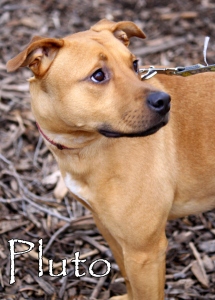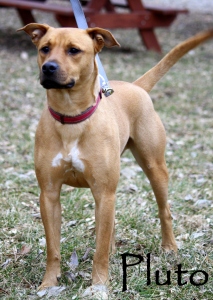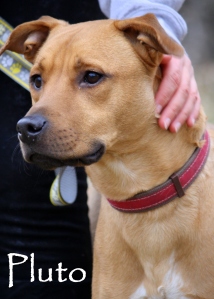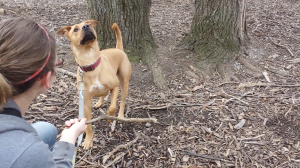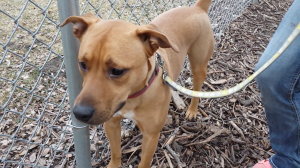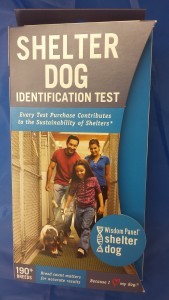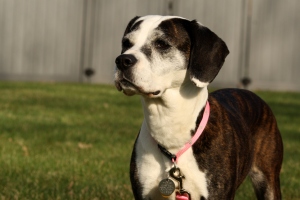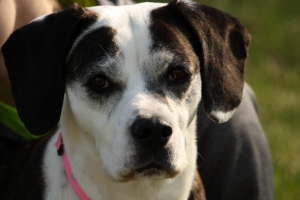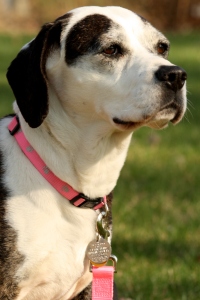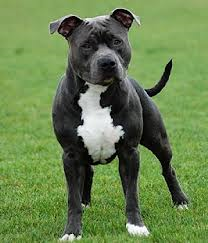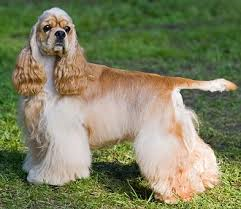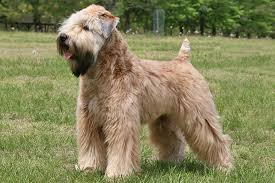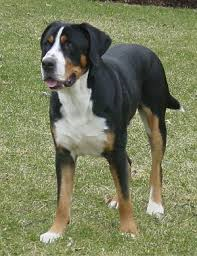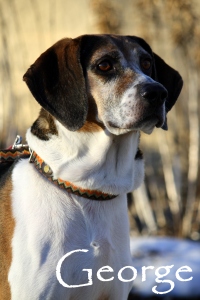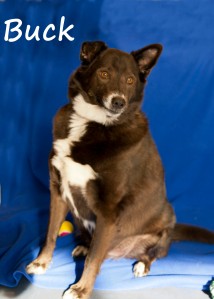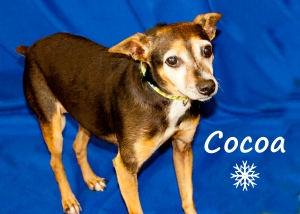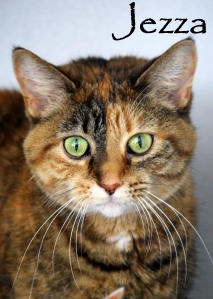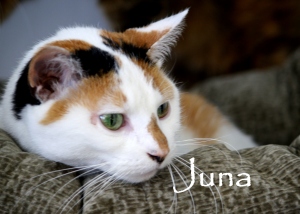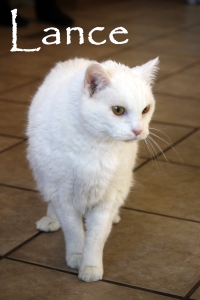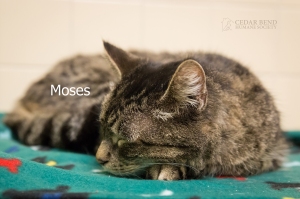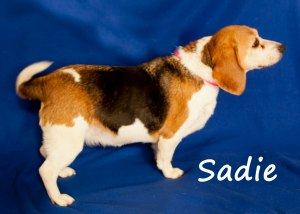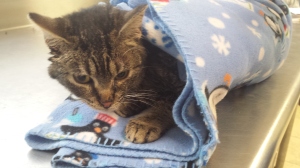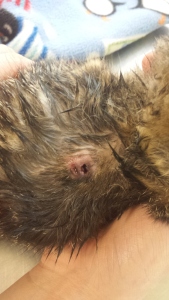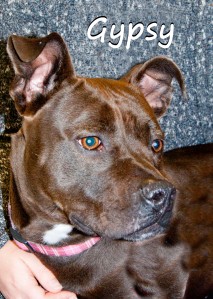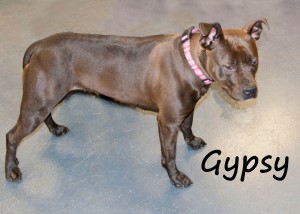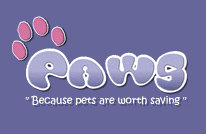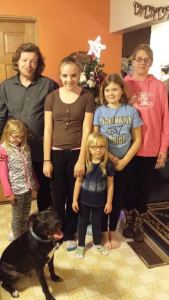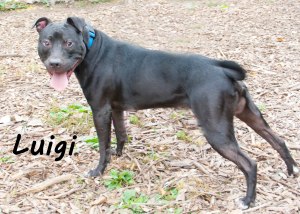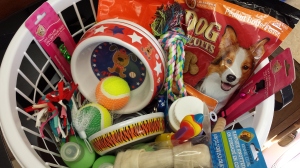Are you looking for a dog that loves to play? Look no further than Pluto. Pluto is about a year old, and we think he’s a Rhodesian Ridgeback and lab mix. He’s mostly tan with a little white on his chest. Pluto is an active dog, and he needs a home that’s going to keep him busy. He loves playing with Frisbees and tennis balls. He’s got the chase part down, but he still needs a little work on bringing the toy back! Pluto does very well with other dogs. However, a home without cats is best. He is a very sweet, friendly, and affectionate dog. Pluto loves attention from people. Just know he is naturally curious and easily distracted. Will you give Pluto his FURever Home? Visit the Cedar Bend Humane Society at 1166 W. Airline Highway in Waterloo to meet Pluto and to fill out an adoption application. Pluto is in a foster home, so he’s only at our adoption center on Fridays, Saturdays, and Sundays from 10 a.m. to 5 p.m.
Monthly Archives: January 2015
Doggy DNA Testing
One of our adoption counselors just did a Wisdom Panel DNA test on her dog, Sabrina.
Sabrina was adopted from the Cedar Bend Humane Society in April 2014.
The DNA test detected four key breeds for Sabrina.
Thanks for making your predictions!
Here are the four key breeds detected in Sabrina’s DNA test:
1. American Staffordshire Terrier
2. Cocker Spaniel
3. Soft Coated Wheaten Terrier
4. Greater Swiss Mountain Dog
Do you see the resemblance?
The Wisdom Panel DNA tests are available at the Cedar Bend Humane Society for $70.
FURever Home Friday: George
With his nose to the ground, George is hot on the trail!
Hot on the trail of what? In this case, probably a squirrel.
George is a medium-sized, six-year-old Coonhound looking for a new home.
He loves to ride in the car, and he’s happy to take a road trip with you!
He knows how to sit, and even sitting down he still manages to wag his tail constantly!
George has a hound voice that he sometimes likes to share. He does well with other dogs. Coonhounds especially enjoy being part of a group. However, George isn’t a big fan of cats. We think he’d prefer a home without any feline friends.
Besides tracking and getting some love, George also enjoys going to the groomer for a spa day.
He really is a sweet boy!
Will you give George his FURever home?
Visit the Cedar Bend Humane Society on W. Airline Highway to meet George and to fill out an adoption application.
We’re open all weekend from 10 to 5.
12 Reasons Why it’s Great to Adopt a Senior Pet!
1. What You See Is What You Get
Older dogs are open books—from the start, you’ll know important things like their full-grown size, personality and grooming requirements. All this information makes it easier to pick the right dog and forge that instant love connection that will last a lifetime. If you’re not so into surprises, an older dog is for you!
2. Easy to Train
Think you can’t teach an old dog new tricks? Hogwash! Older dogs are great at focusing on you—and on the task at hand—because they’re calmer than youngsters. Plus, all those years of experience reading humans can help them quickly figure out how to do what you’re asking.
3. Seniors are Super-Loving
One of the cool parts of our job is reading stories from people just like you who have opted to adopt. The emails we get from pet parents with senior dogs seem to all contain beautiful, heartfelt descriptions of the love these dogs give you—and those of you who adopted dogs already in their golden years told us how devoted and grateful they are. It’s an instant bond that cannot be topped!
4. They’re Not a 24-7 Job
Grownup dogs don’t require the constant monitoring puppies do, leaving you with more freedom to do your own thing. If you have young children, or just value your “me time,” this is definitely a bonus.
5. They Settle in Quickly
Older dogs have been around the block and already learned what it takes to get along with others and become part of a pack. They’ll be part of the family in no time!
6. Fewer Messes
Your floors, shoes and furniture will thank you for adopting a senior pooch! Older dogs are likely to already be housetrained—and even if they’re not, they have the physical and mental abilities to pick it up really fast (unlike puppies). With their teething years far behind them, seniors also are much less likely to be destructive chewers.
7. You Won’t Bite Off More Than You Can Chew
There are those who yearn for a doggie friend of their own, but hold back because they worry what might happen in their lives in the years to come. And they are wise to do so—a puppy or young dog can be anywhere from an 8- to 20-year responsibility, which is not appropriate for the very elderly or those with certain long-term future plans. Providing a loving home for a dog in her golden years is not a less serious commitment, but it can be a shorter one.
8. They Enjoy Easy Livin’
Couch potato, know thyself! Please consider a canine retiree rather than a high-energy young dog who will run you ragged. Not that older dogs don’t require any exercise—they do—but they’re not going to need, or want, to run a marathon every day.
9. Be a Hero!
At shelters, older dogs are often the last to be adopted. You’ll feel the rewards every day you spend together of bringing an older animal into a good home
10. Older dogs make instant companions.
Unlike a puppy, which requires leash training, etc. an older dog is ready to accompany you on a long walk and already knows how to play fetch. An adult dog will make a great workout partner, a loyal companion, and a late night snuggle buddy.
11. Older dogs are not necessarily “problem dogs” as many tend to think.
Senior dogs lose their homes for a variety of reasons, usually having nothing to do with their behavior or temperament, but more due to the fact that their owners are unable to keep them for reasons including: the novelty of owning a dog wearing off, allergies, death of a guardian, a new baby, loss of a job, a move, change in work schedule, and various other lifestyle changes. These dogs need homes just as badly as young adoptees do, and make wonderful household pets.
12. They’re CUTE!
Need we say more?
Source Credit: ASPCA and Cesar Millan
—————–
Here are some senior pets available for adoption at the Cedar Bend Humane Society in Waterloo:
Pets in Need: Hope
Hope is at the Cedar Bend Humane Society after getting caught in a live cat trap and coming to us as a Black Hawk County stray.
We think Hope is about seven months old.
She suffered a puncture wound on her neck, and she also injured her upper lip.
We’re currently treating her injuries. We will hold Hope for five days to see if an owner is found before finding her a new home.
Hope is just one of the many animals we take in that require medical attention.
In fact, we spend approximately $50,000 a year in medical expenses to treat sick or injured animals.
Donations are always appreciated to help us cover some of the cost of medical treatment. Click HERE to donate.
PAWS Humane Society Partnership
Gypsy just arrived at the Cedar Bend Humane Society from PAWS Humane Society in Charles City. We accepted Gypsy, a five-year-old pit bull, into our adoption program to give her a little more exposure to help her find a forever home.
Ear Cleaning Tips for Dogs and Cats
 According to Animal Humane Society, keeping the inside surfaces of your dog’s ears clean will not only feel good to your dog, but is good way to help prevent ear infections. Examining the outside surface will also alert you to the presence of wood ticks, fleas, or anything else unusual.
According to Animal Humane Society, keeping the inside surfaces of your dog’s ears clean will not only feel good to your dog, but is good way to help prevent ear infections. Examining the outside surface will also alert you to the presence of wood ticks, fleas, or anything else unusual.
How often?
Clean your dog’s ears about once a week.
How to get started?
You can use either a cotton ball or a piece of gauze with ear cleaning solution, or you can use a baby wipe wrapped around your finger. Don’t use water because it doesn’t evaporate very easily. Wipe the inside surface of your dog’s ear, going down only as far as your finger easily fits. Don’t use Q-tips or try to put anything further down the ear canal or you will risk causing a painful ear injury.
Tips for dogs from the ASPCA:
Canine Anatomy
Because of the twisty, curvy design of a dog’s inner ears, it’s easy for parasites, bacteria and yeast to hide and thrive in them. This also means that any debris in the canal must work its way up to escape. Infections can result from trapped debris. Dogs with allergies are particularly vulnerable, as are those with floppy ears, like Cocker spaniels, basset hounds and poodles.
Routine Care
Your dog’s regular grooming/maintenance routine should include regular ear checks. This is especially important for dogs who produce excessive earwax or have a lot of inner-ear hair:
- If your dog’s inner ears appear dirty, clean them with a cotton ball dampened with mineral oil, hydrogen peroxide or a solution formulated specifically for this purpose. Inner-ear skin is delicate, so allow your vet to demonstrate the proper method for cleaning your dog’s ears.
- Do not clean your dog’s ears so frequently or deeply as to cause irritation, and take care to NEVER insert anything into your dog’s ear canal.
- If your dog sprouts hair from his ear canal, you or your groomer may have to tweeze it out every few weeks to prevent problematic mats and tangles from forming. Please discuss with your vet whether this is necessary for your dog.
Wet Behind the Ears?
If you’re not careful, frequent bathing and swimming can lead to irritation and infection. To prevent this from happening, place cotton in your dog’s ears before baths, and be sure to dry her ears as thoroughly as you safely can after all water sports and activities.
If your dog is prone to ear infections, you might want to pour a tiny amount of an ear drying solution made for dogs into her ear canals to help evaporate any water trapped inside. These ear washes, usually witch hazel-based, are available at better pet supply stores.
Danger Signs
Contact your veterinarian if you notice any of the following symptoms affecting your dog’s ears:
- Ear discharge
- Bad smells
- Redness
- Swelling
- Crusty skin
- Hair loss
Please also be aware that brown or black ear wax—and dry, dark wax resembling coffee grounds—are classic indicators of microscopic ear mites. Only your vet can tell for sure, so please don’t delay bringing a gooey-eared pooch in for a checkup.
——————-
Tips for Cats from the ASPCA:
Ear Cleaning 101
Place a little bit of liquid ear cleaner (ask your vet for a recommendation) onto a clean cotton ball or piece of gauze. Fold kitty’s ear back gently and wipe away any debris or earwax that you can see on the underside of her ear. Lift away the dirt and wax rather than rubbing it into the ear. And do not attempt to clean the canal—probing inside of your cat’s ear can cause trauma or infection.
Signs of Ear Problems
Watch for the following signs that may indicate your cat’s ears should be checked by a veterinarian:
- Persistent scratching and pawing of the ear area
- Sensitivity to touch
- Head tilting or shaking
- Loss of balance and disorientation
- Redness or swelling of the ear flap or canal
- Unpleasant odor
- Black or yellowish discharge
- Accumulation of dark brown wax
- Hearing loss
- Bleeding
Know Your Ear Disorders
- Ear mites are common parasites that are highly contagious among pets. Telltale signs include excessive itching of the ears and debris that resembles coffee grounds.
- Ear infections are usually caused by bacteria, yeast or foreign debris caught in the ear canal. Treatment should be sought immediately as ear infections can cause considerable discomfort and may indicate allergies, hormonal abnormalities or hereditary disease.
- Blood blisters (hematoma) are the result of blood accumulation in the ear flap. They’re often caused by infection, ear mites, fleas or trapped debris that causes your cat to scratch her ears or shake her head excessively.
Taco Bell Collecting AND Matching Donations
Thank you Taco Bell for giving us donations boxes at the restaurant locations in Waterloo and Cedar Falls!
At the end of the year, Taco Bell will match all the donations collected.
The next time you enjoy a meal at Taco Bell, please put a few cents in our donation box! Every penny will add up by the end of the year.
We appreciate your support!
Where Are They Now? Luigi’s Update
Here’s another update on one of our furry friends! See how Luigi is doing after being adopted from the Cedar Bend Humane Society.
LUIGI’S UPDATE:
With four daughters, two dogs, and a cat… there’s rarely a dull moment in the Lamphier house, but Luigi doesn’t mind the excitement.
Bobbi Jo Lamphier adopted Luigi from the Cedar Bend Humane Society in October 2014.
Luigi adjusted quickly to life in his new home in Alpha in Fayette County.
One of Luigi’s favorite things to do now is sit in this chair with Paul Lamphier. He loves to cuddle, and he clearly thinks he’s a lap dog!
Luigi originally came to Iowa as part of a partnership with the ASPCA.
Bruce Earnest works for the ASPCA, and it was obvious Luigi remembered Bruce and was very happy to see him!
This is definitely one of the perks of the job, seeing great animals end up in great homes.
Luigi loves to lick leftover food off of little fingers, he can rollover, and he doesn’t mind getting his fur brushed.
Luigi is never lacking for attention, and he doesn’t even mind sharing some of the attention with the family’s other dog, Pawn, or the cat, Midnight.
Yes, it’s a full house. But it’s a happy house!
Thanks to the Lamphiers for giving Luigi a fun and a loving place to call home.
Gifts From Drew
Thank you to Bridget Gabriel for choosing to donate to us in memory of a family friend, Drew Scott.
Drew would have turned 26 on January 16th. However, he passed away after a vehicle accident on April 5, 2009.
Below are portions of a letter shared with us describing more about “Gifts From Drew.”
——–
“Drew’s sister, Mallory, is my best friend. The Scott family became my second family many, many years ago. This year for Drew’s birthday the Scott family decided to do an awesome ‘act of kindness’ day!
I chose the animal shelter as my act of kindness because I believe it should go to a place where they made a difference in my life. Six years ago, my family adopted my partner in crime, my dog Hud. Hud brings so much joy and happiness in my life.
Drew was a happy-go-lucky guy. Always joking around and having fun. He loved animals, and would love that we are continuing to remember him on his 26th birthday by doing an act of kindness.
The Scott family is doing 26 acts of kindness and asked his friends to do the same. I ask you to spread the joy!”
#GiftsFromDrew
—————
Thank you, Bridget, for including us in your act of kindness in memory of Drew!

